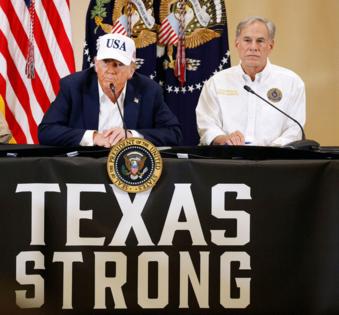Commentary: Let voters, not politicians, decide elections
Published in Op Eds
The effort in Texas to hastily redraw congressional maps for partisan advantage reveals vulnerabilities in our democratic system, subject to exploitation by bad actors. As this crisis escalates into multiple states, it threatens the notion that voters should determine who wins elections.
Driving the effort to rig these maps is President Donald Trump’s anxiety over potentially losing control of the U.S. House of Representatives in next year’s midterm elections. To avoid that outcome, Trump asked Texas Republicans to redraw voter boundaries in order to add five more Republican seats.
U.S. Attorney General Pam Bondi’s Justice Department wrote to Texas Gov. Greg Abbott, falsely asserting that the current maps violate federal law. The letter demanded that Texas further exacerbate its existing partisan gerrymander by adopting an even-more-audaciously partisan mid-decade redistricting plan.
Abbott obeyed, calling the Texas legislature into special session to adopt new maps. In response, most members of the Democratic caucus in the Texas House fled the state to deprive the legislature of a quorum and forestall Trump’s plan. Abbott declared this action unlawful, asserting the lawmakers can be removed and replaced, and ordering their arrest. (It appears Abbott will now call a second special session, and the Democratic House members will return.)
This has triggered another troubling development: Democrats have publicly proposed that “blue” states respond in kind. They say California, New York, Illinois and possibly other Democrat-led states should immediately redistrict to create more Democratic-leaning congressional districts. And there is talk that Republicans in Ohio, Florida, Indiana and Missouri may re-tinker with their maps as well.
As an advocate for redistricting reform in Wisconsin, I believe nothing good can come from Trump’s redistricting arms race. This is happening solely due to his unwillingness to abide by democratic norms, which is nothing to emulate (as some are beginning to recognize). Rather, this should be an opportunity to think anew about the process and standards used to draw the representative districts that underlie our democracy.
The constitutional guarantee of “one person, one vote” means each of us should have an equal say in who represents us in government and makes the laws by which we all live. We uphold this principle by redistricting at the beginning of each decade, using new census data to divide our population into electoral districts, for everything from city councils to state legislatures to the U.S. House of Representatives.
Drawing district lines has always been entwined with efforts to game the system for advantage. These efforts, called gerrymandering, can take many forms. But all wrest power away from voters by fixing electoral outcomes, transforming campaigns that should be contests of ideas into preordained charades. Voters have little say because the district lines are drawn, using incredibly precise partisan data, in ways that preclude actual competition.
Yet the harm from allowing Texas to ram through Trump’s plan will be compounded if blue states retaliate with new maps to balance the net partisan impact. This, too, would threaten the foundational concept — the credo of our nation — that we, the people, choose our leaders.
There is a better way.
Districts can and should be drawn both to avoid significantly advantaging one political party over another and to increase electoral competition. Whenever it is otherwise, elected officials have less incentive to be responsive to voters.
Law Forward, the pro-democracy law firm I head, is currently urging the Wisconsin courts to evaluate the state’s congressional map, which was purposely drawn to give Republicans an advantage. We believe the state’s courts should recognize competition as a relevant criterion in evaluating maps. And courts across the country should follow suit.
Court intervention is not the ultimate solution. Every state should adopt independent, nonpartisan redistricting models. The Wisconsin Fair Maps Coalition is holding hearings around the state, engaging voters in discussion about how maps should be drawn and what factors should be considered.
Several other states have adopted nonpartisan redistricting models that are working. We should demand this approach be expanded, not restricted or scrapped.
What’s happening in Texas is a travesty for democracy. The consequences affect every American. We, as voters, must demand better.
_____
Jeffrey A. Mandell is the president and general counsel of Law Forward, a nonpartisan, nonprofit law firm focused on defending and advancing democracy in Wisconsin. This column was produced for Progressive Perspectives, a project of The Progressive magazine, and distributed by Tribune News Service.
_____
©2025 Tribune Content Agency, LLC.

























































Comments